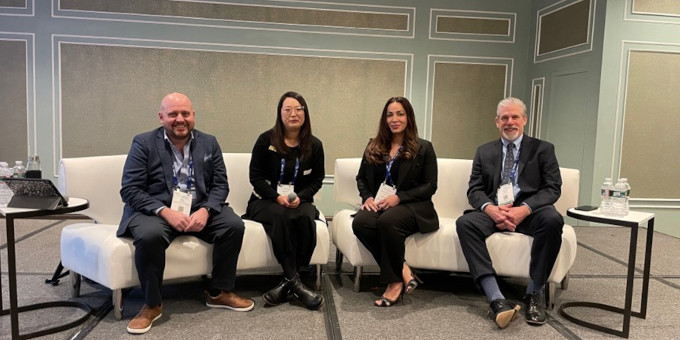

Advice

Leveraging Knowledge Management for Legal Excellence: Strategies and Tools
- Legal Transformation
- 3 Mins
Legalweek NY 2024 Session Recap
Knowledge Management plays a pivotal role in the business of law. The program unearths the latent value of work product, data, and "know-how" that can support and accelerate the practice of law at scale. With the growing use of Generative AI and modern big data tools, Knowledge Management has never been more important to the success of your firm or corporate legal department. Implementing knowledge management tools and strategies and instilling them into your culture and processes is critical in the near, medium, and long-term future of practicing law.
At Legalweek NY 2024, Eric Anderson, Practice Lead, Search, Data, and AI, Fireman, an Epiq company, moderated a panel with several thought leaders in the KM space titled “Leveraging Knowledge Management for Legal Excellence: Strategies and Tools.” Participants included:
- Franchesca Fowler, General Counsel, Vice President and Chief Compliance Officer
- Sharon Lee, Director, Legal Knowledge Management, Liberty Mutual Insurance
- Philip Bryce, Global Chief Knowledge Officer, Mayer Brown
What follows is a summary of the key themes and takeaways from the session.
Harnessing Lawyer Attention
The most valuable commodity in life and the legal industry is time. Prioritizing the most high-value use of time to achieve legal objectives is critical to business goals. By employing advanced data tools and technologies, legal professionals can streamline workflows, identify key areas for improvement, and make informed decisions. As Sharon Lee said, “Knowledge management empowers our lawyers and staff to effectively and efficiently deliver high quality legal services to our clients.” However, this data-driven approach can be time-consuming if knowledge is difficult to access and not integrated into the day-to-day workflows of legal teams.
Effective knowledge tools require the contribution of those using them to remain relevant and effective for the firm or department. As Philip Bryce said, “Our real challenge is to turn individual expertise into institutional expertise.” This challenges knowledge managers: which tools best enhance the lawyers’ use of time, allowing them to use the tools and easily contribute?
Even though the world has become data-driven, humans (even if it is sometimes hard to admit) are narrative-driven. Data-driven narratives need to be communicated and tied to real outcomes in an easy to consume and actionable manner. Data needs to be distilled into insights that are easy to understand and draw attention to where action or a deeper dive is warranted.
It is important to remember that not all lawyers consume data and insights in the same way. Some work best with a comprehensive dashboard that allows them to see what they need to know first thing in the morning, others want to do the same at the end of the day or week. Some lawyers work best with smaller nuggets of information in an email at regular intervals along with an easy-to-take action with a click or reply. Understanding how lawyers work and how tools can enhance that work is critical to the success of a knowledge management program.
In the session, Franchesca Fowler commented on the importance of bringing others into the narrative, “You have to let other voices into the story and let them help tell it. You have to let other people make it their narrative in order for change management to be successful.”
Strategic Foundations: Starting Small for Big Impact
The implementation of tools can be an accelerator for knowledge management. When establishing a knowledge management tooling roadmap, it is critical to create a strong foundation with good data and target small, but scalable quick wins. Identifying the data that can be put to work to deliver actionable insights to lawyers is critical to long-term success.
Modern data tools put organizations in a position to move forward on two critical workstreams. First, you can identify what data sets in your data estate are usable. With these data sets identified you can use them to deliver knowledge products for your lawyers in the near term. This builds trust and gets buy-in for the larger knowledge program up front. Second, understanding which data needs attention and then engaging with the lawyers, practice leads, knowledge, and IT professionals to turn this data from a liability to an asset. Pursuing these streams in parallel engages the entire organization, gains buy-in from key stakeholders, and helps build a culture around knowledge management.
Focusing on quick, scalable wins allows for better engagement with the practice and demonstrates the program’s value. In addition, it provides insight into the people and processes which need to be enhanced. Sharon Lee stressed, “A lot of the time, knowledge management is thought of as a one-size-fits-all solution. It needs to be promoted as an iterative discipline.” The learning achieved with this approach will enhance the products and services on the roadmap, create a better understanding of the culture, and allow for effective change management throughout the process of delivering tools to your lawyers.
The importance of this was underscored by Franchesca Fowler, “We can all agree that the legal landscape is evolving, it’s changing, it’s become less predictable. We want predictability.”
The parallel focus on growing your data maturity and building the required data infrastructure will move what was initially identified as a challenging long-term goal closer to the quick, scalable win category. This focus will help start each initiative in the roadmap farther and farther ahead each time, it is how an organization becomes ready for continuous change and delivery of knowledge management and technology, and as Philip Bryce remarked, “shifts from information management to decision management,” enabling organizations to continuously adapt to a changing landscape and drive excellence while others are trying to catch up.
The views expressed by the quoted individuals in this blog post do not necessarily reflect the opinions or policies of their organizations.
The contents of this article are intended to convey general information only and not to provide legal advice or opinions.
